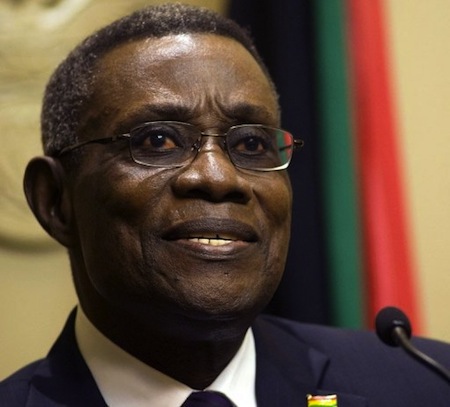Guest post by Andrew Novak.
Ghanaian President John Atta Mills, 68, passed away on July 24, 2012.![]()
The former vice president of Jerry Rawlings, the longtime, charismatic military ruler of Ghana turned democratically-elected head of state, Professor Mills was deferential to and often overshadowed by Rawlings throughout his political career. The modest and scholarly Mills, who taught law at the University of Ghana, first ran for the presidency himself in 2000, when Rawlings was term-limited, but lost to opposition leader John Kufour of the New Patriotic Party (NPP) in Ghana’s first peaceful change of power since independence.
In 2008, when Kufour himself was term-limited, Mills ran against Kufour’s vice president, Nana Akufo-Addo, whom he trailed after the first round by a margin of 47.92% to 49.13%. However, Mills ultimately defeated Akufo-Addo in the second round, with a margin of 50.23% to 49.77%, making it the closest peaceful election of its scale in modern African history. Perhaps even more surprising, closely following the 2007 elections in Zimbabwe and Kenya, the vote led to Ghana’s second peaceful transition of power without a single life lost.
Professor Mills, said to have been at heart an academic rather than a politician, was a stickler for the constitutional rule of law. By the end of his term Ghana was the fifth least corrupt country on the African mainland according to Transparency International.
When Ghana began offshore oil production for the first time in 2010, Mills vowed to avoid the waste and corruption associated with the oil industry in nearby Nigeria. Last month, Mills accepted nearly all of the recommendations of the Constitutional Review Commission (CRC) to comprehensively update Ghana’s constitution, with proposed amendments to be submitted to popular referendum. The CRC’s White Paper called for, among other issues, abolition of the death penalty, protection of consumer rights, constitutionalization of the right to a healthy environment, and establishment of a comprehensive legal aid scheme. Whether the CRC’s recommendations will be implemented remains to be seen should Mills’s ruling party, the National Democratic Congress, lose the upcoming elections in December 2012 to the NPP.
Even at his death, the rule of law triumphed in Ghana when Vice President John Dramani Mahama was sworn in within hours. In this way, Ghana avoided the same uncertainty as when Malawian President Bingu wa Mutharika passed away in office last April, sparking speculation that Vice President Joyce Banda would be passed over for the presidency in defiance of the constitution.
But unlike Ghana, Malawi’s change in power was dramatic — Mutharika ran an unpopular regime, one bleeding support from foreign donors and dogged by street protests, and Banda had previously been expelled from the ruling party.
Nonetheless, the peaceful transfers of power across the continent over the past year in Zambia, Senegal, Malawi, and Lesotho may well prove that democracy is maturing in Africa for one simple fact: three of these four countries, like Ghana, have experienced not just one but two peaceful transitions of power since independence.
Andrew Novak is the adjunct professor of African Law at American University Washington College of Law. He has a J.D. from Boston University and an M.Sc. in African Politics from the London School of Oriental and African Studies—President John Atta Mills’s alma mater.
